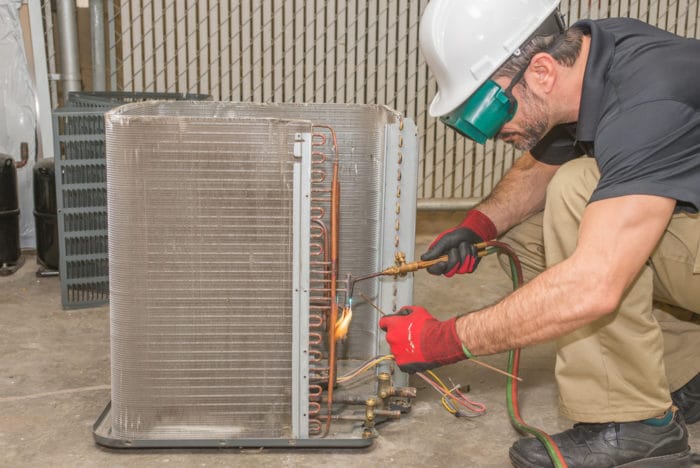Why We Love It
-
$47,380Potential Avg. Salary
-
13.6%Job Growth Rate
-
Growing DemandJob Outlook
-
Don't Take Work HomeCareer Attribute
HVAC Technicians install, maintain and repair heating, ventilation and air conditioning systems.
Recommended Schools
What is a HVAC Technician?
HVAC Techs perform specific tasks involving the installation, repair and maintenance of systems composed of heating, ventilation, air conditioning and refrigeration functions. Technicians must be able to quickly identify problems or malfunctions, assess the situation and then carry out the repairs. These systems control the temperature and climate inside of offices, homes, warehouses and various other types of buildings. HVAC technicians typically work in either commercial systems or the residential marketplace, but both can be physically rigorous due to the hands-on nature of the work. Safety precautions are of paramount importance, including the use of protective gear such as safety glasses, masks and hardhats.
Technicians must have solid interpersonal skills to effectively deal with customers in what is often a stressful situation. Additionally, physical strength and stamina are needed to fulfill the demands of the job, which are often undertaken alone, such as the assembling, disassembling and lifting of machinery and standing or walking for hours.
In the course of their work, HVAC Technicians typically fulfill the following responsibilities:
- Perform the installation of heating, ventilation, refrigeration and air conditioning systems using blueprints or schematic design specifications
- Inspect and maintain HVAC systems including the testing of various apparatus and individual components; making any and all necessary repairs to repair or replace defective components
- Manage systems which function with water and fuel supply line
- Connect and/or install electrical wiring, controls and panels; ensure operational effectiveness through update
- Improve the efficiency of HVAC systems, particularly with regards to efficient energy output and ‘going green’
Day in the Life
HVAC systems maintain and preserve the air quality, temperature and humidity in homes and buildings. Technicians tend to focus on the installation, repair and maintenance of those systems, but more and more are becoming specialists in more particular aspects of the field, such as solar panels, commercial and residential refrigeration, radiant heating and renewable energy systems. Specialization is made all the more complex with regulations dictating the handling and disposal of gas, waste and liquids.
HVAC technicians use a variety of different tools in their day-to-day work. The installation of air conditioning systems may require simple hand held tools such as wrenches, screwdrivers, hammers, wire cutters. At the same time, an array of more sophisticated and complex tools might be utilized, for instance voltmeters, carbon monoxide testers, torches, combustion analyzers and machinery to move and lift heavy equipment. All of this will require technicians to carefully plan, utilize problem-solving skills, operate a variety of equipment with high levels of accuracy and operate within physically challenging environments, such as high-rises or basements with antiquated safeguards.
HVAC technicians work in officers, factories, schools, stores and homes. Assignments may be to specific sites or include multiple buildings in the same day. Work is primarily indoors, but uncomfortable or cramped spaces are all too common. The overwhelming majority of HVAC technicians work full time, with occasional overtime and evening or weekend shifts.
Due to the sometimes hazardous nature of the work, injury and illness rates are higher for HVAC technicians than for the average job. Burns, broken bones, electric shock and bruises are amongst the dangers and appropriate caution is needed, along with the requisite safety equipment and proper apparel.
JOB GROWTH
Employment of HVAC technicians is expected to increase over the next ten years, at a faster rate than the average for all occupations. The demand for ‘going green’ rising from the public and corporations alike presents a promising future for technicians, as more efficient, greener models must be installed and maintained.
Recommended Schools
How To Become a HVAC Technician
There is no minimum degree requirement in becoming a HVAC Technician, although some measure of technical training and a high school diploma are typically held. The ability to perform manual labor is also absolutely essential. Many HVAC Techs participate in apprenticeship or certification programs to give the necessary training and experience with tools and equipment. These typically last around 3-4 years and are often, but not always, financially subsidized by an employer or trade organization.
Some states require HVAC Techs to be licensed, however requirements vary amongst regions and even localities. In all cases, an exam must be passed to obtain a license. Certification is required for certain specialty assignments, such as working with refrigerants, furnaces or other dangerous systems. Background checks are often required as technicians will work in and around residential buildings.
HVAC Technician Salary Data
We’ve provided you the following to learn more about this career. The salary and growth data on this page comes from recently published Bureau of Labor Statistics data while the recommendations and editorial content are based on our research.
National Anual Salary
Low Range
$34,920Average
$47,380High Range
$71,690National Hourly Wage
Low Range
$17/hrAverage
$23/hrHigh Range
$34/hrHow do HVAC Technician salaries stack up to other jobs across the country? Based on the latest jobs data nationwide, HVAC Technician's can make an average annual salary of $47,380, or $23 per hour. This makes it an Above Average Salary. On the lower end, they can make $34,920 or $17 per hour, perhaps when just starting out or based on the state you live in.
Salary Rankings And Facts
#421 Nationally for All Careers
Highest Education Among HVAC Technicians
- 0.2% Doctorate
- 0.5% Masters
- 4.1% Bachelors
- 13% Associates
- 30.9% College
- 39.5% High School
- 11.7% Less than High School
Job Growth Projections and Forecast
2014 Total Jobs
292,0002024 Est. Jobs
331,600Job Growth Rate
13.6%Est. New Jobs
39,600How does HVAC Technician job growth stack up to other jobs across the country? By 2024, there will be a change of 39,600 jobs for a total of 331,600 people employed in the career nationwide. This is a 13.6% change in growth over the next ten years, giving the career a growth rate nationwide of Below Average.
Growth Rankings And Facts
#122 Nationally for All Careers
What Companies Employ The Most HVAC Technicians
| Industry | Current Jobs | New Jobs Needed | % Increase |
|---|---|---|---|
| Plumbing, heating, and air-conditioning contractors | 183,200 | 35,800 | 36% |
| Self-employed workers | 25,100 | 1,100 | 1% |
| Direct selling establishments | 9,500 | -1,000 | -1% |













